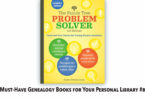A third must-have book for your personal genealogy library is “Organize Your Genealogy: Strategies and Solutions for Every Researcher”, by Drew Smith. When you do a lot of genealogy work, it can be challenging to keep it all in order. Even if you are a beginner, keeping everything in order right off the bat can be a challenge, especially once those records start coming into your physical and digital collections. You truly want to have all of your genealogy organized so well that everything you might need at a given moment is easily right at your fingertips, with no frustrated or tedious searching involved. This book gives you an easy way to do just this thing.

You have a lot of things to keep track of in doing your genealogy research. There are facts, files, data, documents, and more, and they all need to be managed. This book shows you some simple methods of organizing your genealogy that are both tried and true. In fact, you will learn how to easily organize every aspect of your genealogy work, from your physical and digital files to your software, your workspace, your research plan, your family history discoveries, and the latest genealogy technology you will almost certainly acquire in doing your work.
Not only this, but the book also teaches you to stay organized from the beginning, not just how to organize what you already have in your genealogy project. You will learn how to manage your time and resources in your genealogy work, the best way to set genealogical research goals, the best way to decide on genealogy research questions to tackle that are actually workable, the best way to keep track of online and physical genealogy correspondence, a great way for planning a genealogical research trip into the field, and the importance of developing a genealogical skill-building plan (as well as how to easily do it).
Essentially, this book is your guide to maximizing your genealogical research time and resources and putting yourself on the path to success in your genealogical endeavors. You need this book on your personal genealogy library shelf, no matter your level of experience.
The book even helps you out in your quest to organize your genealogy by providing easy-to-use checklists and worksheets that you can use to apply all of the teachings in the book. It won’t just leave you high and dry after you read about what you should do. The book actually puts the tools in your hands to get it done with such ease, you will hardly know you’re doing anything at all. When you turn around, your genealogy research will be organized, you will have a workable research plan, and you will be on the path to genealogical success. This book is an invaluable tool.
Let’s face it. We can all use new and innovative suggestions for getting organized. This book is perfect for that and is helpful for genealogists of all skill levels.






